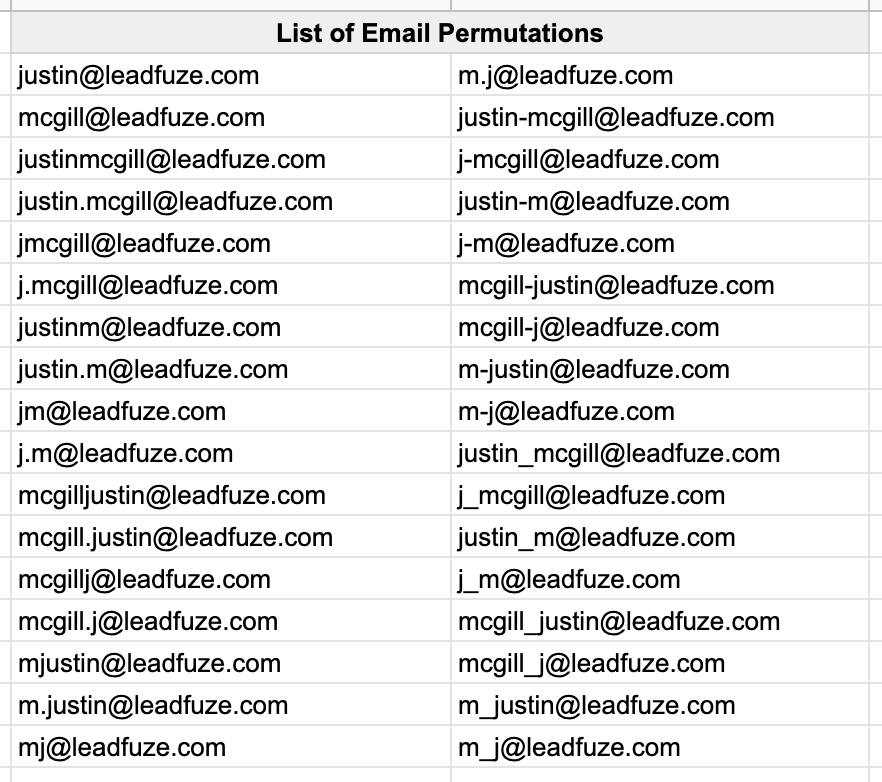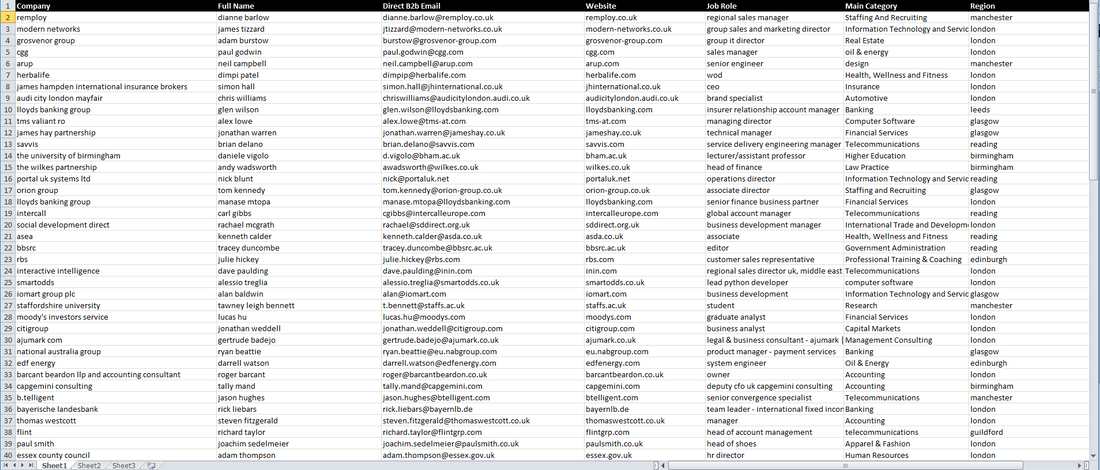Handy Ideas On Deciding On An Email List Website
Wiki Article
What Aspects Should I Consider When Buying An Email List Of Pathologists?
When purchasing a pathologist email list, several key factors must be considered to make sure that the information you acquire is accurate and in compliance with the law, and suitable for your outreach or marketing objectives. Consider the following factors: Quality of data and accuracy
Source of Data - Check the source of data. This could be professional directories like healthcare databases or verified opt-in contacts. This guarantees that the addresses you receive are current and relevant.
Verification Process: Confirm that the email address has been checked recently. The service provider should have a method for validating and cleaning emails. This includes the removal of invalid or unactive addresses. High-quality lists have lower bounce rates, which results in better delivery.
Segmentation and Customization: Search for lists that allow you to segment by the location and subspecialty (e.g. pathology for forensics or clinical pathology) and experiences years or hospital affiliations. Customization lets you target your marketing and helps you connect with the right audience.
2. Legal Regulations
Data Privacy Regulations: Ensure that the email list complies with data privacy laws like the General Data Protection Regulation (GDPR) in Europe, the California Consumer Privacy Act (CCPA) in the U.S., and any other relevant laws. Pathologist data must be collected and processed in a legally-compliant manner that respects privacy rights of individuals. rights.
CAN-SPAM Act: If you live in the U.S.A. or you are aiming at U.S.pathologists Make sure your email list complies under the CANSPAM Act. It governs every commercial email. The penalties for not complying are steep.
Verify the email list has been compiled with the appropriate consent. This ensures that pathologists agree to receive information from the company, reducing any spam complaints.
3. Provider Reputation
Credibility of the Provider: Search for a reputable firm that has a track record of supplying accurate and dependable lists. You can assess the quality of service by reviewing reviews, asking for testimonials, and comparing references with other healthcare marketing professionals.
Transparency - The provider must be transparent regarding the methods used to collect information and the frequency of updates. Avoid providers that are vague about the source of their email lists.
Customer Service: Choose a business that offers a solid customer service if you have any queries about the information on this list, or if you encounter problems with technology.
4. Cost and return on investment (ROI).
Pricing Model: Think about different pricing models like pay-per-contact, fixed fees for lists or subscriptions. Make sure the price is in line with your marketing budget and ROI potential.
Refund Policy. Some service providers provide refunds on emails that don't conform to their standards or are not valid. Be sure to verify the company's policies on refunds and replacements.
Value for Money: Compare the quality of the lists, the level of segmentation and other services provided (e.g., CRM integration and campaign management) against the cost. The most affordable list might not be the most effective if it leads to poor delivery.
5. Data Ownership and Usage
Licensing and Usage Rights: Make sure you know whether you're buying the list to use for one time or if you'll have the data to run ongoing campaigns. Some providers offer single-use licenses and others permit unlimited usage, which could be beneficial for longer-term outreach initiatives.
Exclusive vs. Shared Lists: Decide if the list is exclusively you or is shared with others. Exclusive lists tend to be more efficient since contacts aren't being bombarded by multiple sources.
6. Data Format and Integration
Compatibility of CRM/Email marketing Tools: Check whether the email list you're using can integrate with any existing Email Marketing or CRM tools. The data should be in a format that is widely used, like CSV as well as Excel. This will allow for seamless import.
Data Segmentation: Consider the ease to segment and filter the list once it's been integrated. Effective segmentation is essential to creating personalized email marketing campaigns that are more likely be read and reacted to.
7. Ethical Aspects
Relevance of your message Pathologists are highly skilled professionals. Make sure that your message products or services are pertinent to their requirements. Inadequate messages can damage your reputation and result in spam complaints.
Spam Reports can result due to sending excessive emails or unsubmitted content. Use the list with care to avoid damaging your reputation.
You can also read our conclusion.
If done correctly, buying an email list of pathologists could be a powerful tool for marketing. Make sure to prioritize data compliance, provider reputation, and the quality of the information to maximise the potential of your list. Be sure to ensure that your list is crafted for your specific needs. Be sure to comply with the privacy laws as well as ethical marketing practices. These guidelines will help you develop successful email campaign for pathologists. Have a look at the best pathologist email list for blog guide.

Top 10 Things To Consider When Purchasing An Oil And The Gas Industry's Email List
It is essential to consider a variety of aspects before buying an email list in the gas and oil industries. This will ensure the list contains high-quality information, is legally compliant, and has a high-quality target. Here are the top ten things to think about:
1. Relevance for the intended audience
Industry Focus: Ensure the email list specifically targets the oil and gas sector. The list should be segmented to include professionals, like engineers and geologists, executives and decision makers in upstream operations, midstream operations and downstream operations.
Job Titles and Roles: Seek out a list of job titles and roles of the top key decision makers (executives, managers, engineers and so on.) You can target specific companies.
2. List the source and vendor reputation
Reputable List Providers: Purchase only from email list suppliers that adhere to the best practices. Avoid buying from vendors that have questionable origins. They could have bad quality data or, even more important, legal problems.
Data Quality: Conduct a thorough research or request testimonials in order to evaluate the quality of the data provider.
3. Data Accuracy as well as Quality and Freshness
Data Age: The list must be updated with the most recent contacts. Staff changes are commonplace in oil and gas companies and insufficient contact information could result in high bounce rates.
Verification Process. Make sure that your vendors check regularly and amend their lists to get rid of incorrect or inactive contact details.
4. Compliance with Regulations
Legal Compliance - Make sure the list is in compliance with all local and international laws that govern personal data, such as GDPR, CANSPAM etc. These laws govern the processing and storage of personal information. Non-compliance will lead to serious penalties and legal risk.
Opt-in Process: Determine whether the email address listed on the list was collected with the permission of the recipients, i.e. they've chosen to be notified of messages.
5. Segmentation and Customization
Custom Segmentation: Top quality list providers should have options for segmentation based on elements like the location, job title business size, or sub-sectors in the oil and gas industry.
Custom Filters: Based on the goals of your campaign ensure that the list of filters is customizable based on the criteria of geographical location and size of business, or specific needs.
6. Deliverability Rate
High Deliverability: A high-quality email list will have high deliverability rates (typically 95% or higher). Bounce rates on poor quality email lists may be high, which could harm your reputation and affect marketing efforts.
Test the list and request metrics.
7. Volume vs.
Quality over Quantity: Make sure the list isn't only large in volume but also highly targeted and precise. A shorter list with high quality could yield superior results than a large, generic one.
Engagement Metrics: Concentrate on the number of engagements rather than the amount of contacts. Engaged audiences are more likely respond to your ads.
8. Cost structure and pricing
Transparent Pricing is transparent. Learn the pricing structure. Be wary of cheap, unusually priced lists. They might not provide any value or quality.
Return on investment: Compare the price of the list with the conversion rate expected to determine the ROI. Paying a premium to get a list that is highly targeted can be more cost-effective over the course of time.
9. Privacy and Security of Data Privacy and Security
Data Protection: Make sure that the provider has solid data security practices in place. The list provider must ensure that all personal information is secure from unauthorized access.
Confidentiality: Confirm that the provider won't share or resell data. This is particularly important in the event that you require discretion and confidentiality for your business.
10. After-sales Customer Support
You are able to reach the vendor for support on a regular basis in case you require assistance with your list or if you encounter any issues.
List Replacement Guarantee: In the event that you have any problems regarding the list (e.g. incorrect information, or a poor delivery) A reputable supplier will refund or replace it.
These elements will assist you select an email list for the gasoline and oil industry that is effective and compliant. It must also be in line with your business goals. Read the recommended oil and gas industry email list for site advice.
